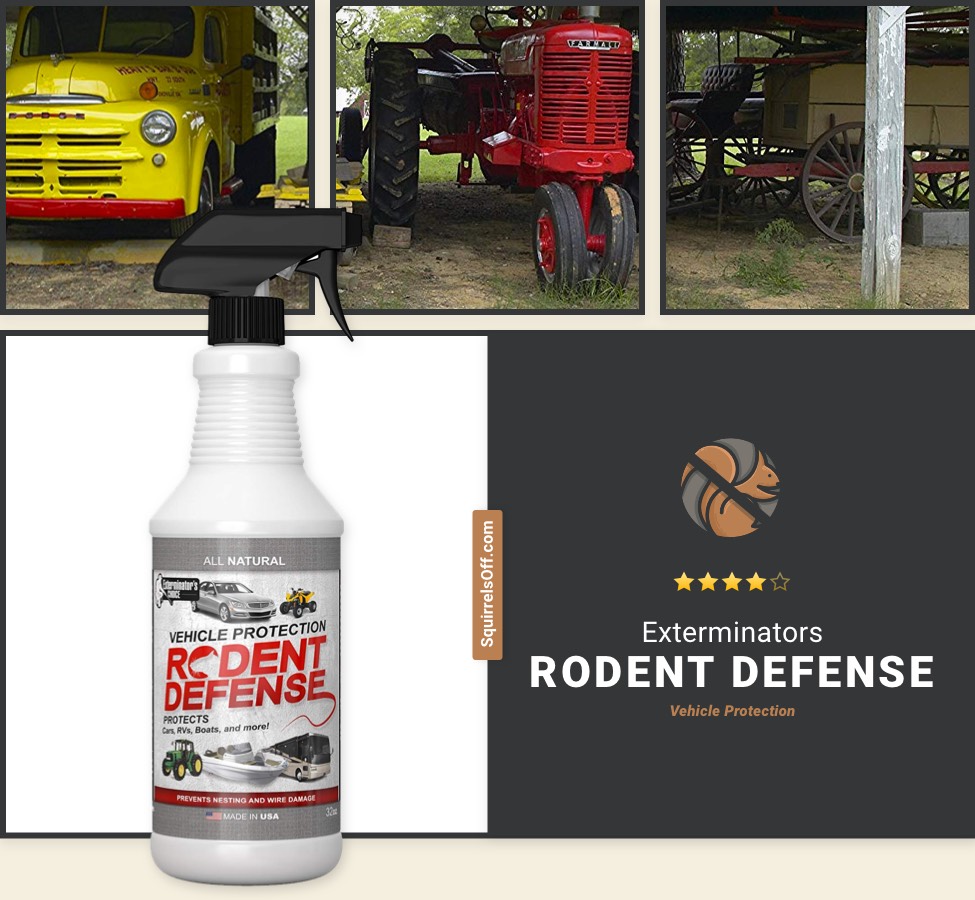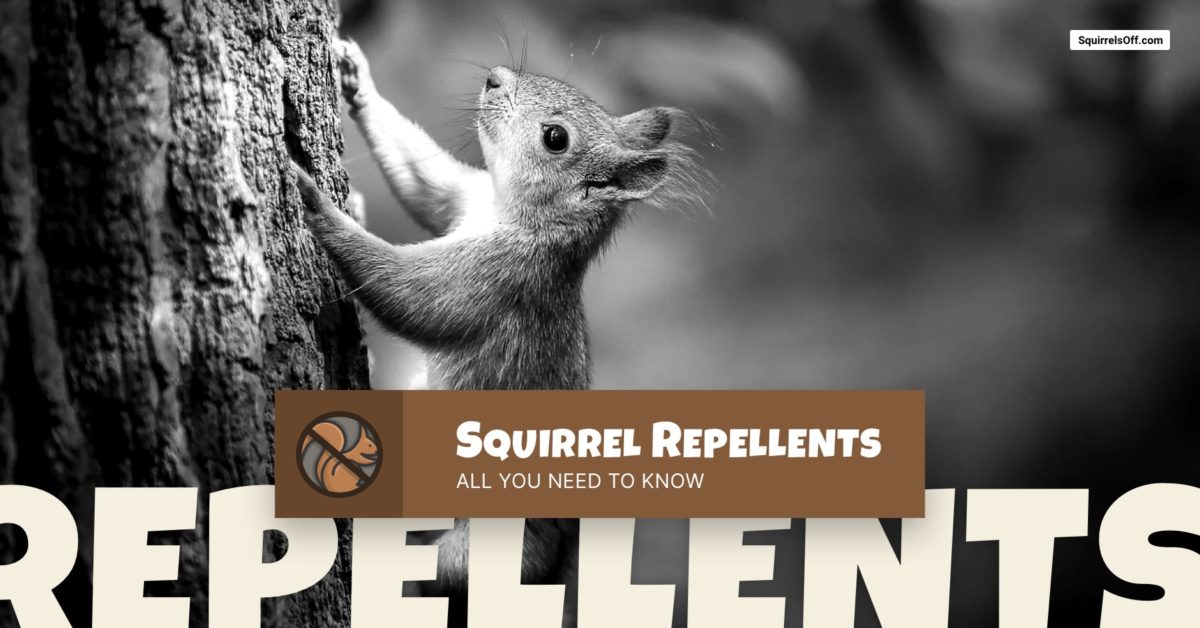Once you’ve grown tired of squirrels damaging gardens, breaking flower parts, building nests within your attic or being too close to your car, they’ve given enough reason to dislike their presence. When there’s an abundance of squirrels there is an increased risk of rabies for your own pets, as well as disease-carrying fleas. Take notice of any droppings around your garage, scratching, rustling or clicking noises in your attic, which are all signs of a possible infestation.
Rodent infestations don’t always mean resorting to traps, or even poison to kill them. There are many options available that won’t result in dead animals, or toxins in order to deter squirrels. Keeping rodents at bay, while being gentle on the environment, will allow you to breathe easier and healthier.
How to Deter Squirrels?
1. Identify Damage
When you find yourself in need of a squirrel repellent, it’s best to first determine the location of squirrel damage so you may know where to apply repellents.
2. Choose the Best Squirrel Repellent for You
Follow the information below, for each area of damage, in order to decide which repellent fits your needs best. Repellents should be applied as preventative measures, before damage has begun, in areas of high squirrel density and pressure. Often, in many cases, layering multiple repelling solutions will offer the best possible results, when done on a regular basis.
3. Remove Attractants
It’s important to maintain the cleanliness of your yard, by removing potential food sources, to also prevent pests. See, squirrel repellents work best when they aren’t competing with other attractants nearby.
Tips & Life Hacks:
- The trick of using the repellents is to start applying them as soon as you notice squirrels on your property.
- Then, use different types of repellents, either interchangeably or one after another, so the squirrels don’t get accustomed to it.
- Once squirrels make their nests and establish habits in your yard, they are very difficult to control. This is why squirrel repellents should be used as a preventative measure, or at the very first signs of squirrel damage.
- It’s important to be patient and consistent with your squirrel repelling strategy. Although liquid and granular repellents are effective immediately, their effectiveness relies on a squirrel’s interaction with them. It may take several interactions with the repellent for the squirrel to associate the unpleasant taste and irritation with the protected area.
- Squirrels do the most damage when they are eating or gnawing on birdseed, plants, siding, wires, etc. The best squirrel repellents tackle these problems head-on by targeting and irritating a squirrel’s taste buds. Look for repellents with capsaicin and other pepper-based ingredients that are proven to deter squirrels in this way.
SquirrelsOff.com: All you need to know about squirrel-proof bird feeders
What Kinds of Repellents Exist for Squirrels?
1. Natural repellents
Natural repellents are those of plant origin. They primarily work by odor or taste aversion. Consider planting peppermint across the perimeter of your garden. Other plants that you can consider planting include any type of narcissus bulb (daffodils, paperwhites, jonquils), geranium, and hyacinth. These plants send a message of toxicity odor to the rodents that might keep them at bay at least for a while.
2. Chemical repellents
These types of products usually contain enemy blood traces, predator urine, feather meal, and other ingredients that can scare rodents away. The general rule is that squirrels (and other rodents likewise) get scared when feeling or smelling their enemies, or predators.
3. Electronic Ultrasonic Repellents
Electronic repellents emit high-frequency sound waves that are unbearable for rodents. While the effectiveness of such devices has not been confirmed by serious scientific research, many buyers notice that such devices, in fact, help a great deal.
4. Home-made Repellents
Some nice ideas from Pam, and make sure to check the comments section as well.
Best Electronic Ultrasonic Squirrel Repellent

MaxMoxie Ultrasonic Pest Repeller
It has an extensive track record behind it with a high degree of success at repelling squirrels without killing them. And without having to spray and respray, we might add. It’s an outdoor only solution that aims to keep the squirrels from getting into your house in the first place.
FAQ:
May I eat fruits and vegetables treated by such natural spray?
It is not advisable you consume fruits or veggies treated with a repellent, especially if you are allergic to any of its components. That is why we recommend using repellents either by placing them directly underneath the plants or by mounting a barrier around the plants and applying the repellent on there.
Should I reapply natural repellents after rain?
Yes, you should. Even if the manufacturer claims that there is no need to replace/change or add new portions of a repellent, we still recommend you do. Especially after a heavy rain.
Can you recommend squirrel deterrents for bird feeders?
Yes, you can, in fact, use any deterrent that contains pepper. Spray it directly on the feeder to repel annoying squirrels, while pepper is unpleasant for rodents, birds don’t mind it.
Organic Spray Squirrel Repellent

Exterminators Choice Rodent Defense Vehicle Protection
This is a ready-to-use chemical spray made from all-natural ingredients. Blended with organic essential oils of peppermint and rosemary. Peppermint is a natural energy booster. It’s uplifting and invigorating! However, rodents HATE it! Naturally-derived, non-toxic, pest control spray that you will feel safe using around your home and vehicles.
Conclusion
While the effectiveness of squirrel repellents might be questionable, you can still try to use them as a preventative or short-term measure, or for low population of squirrels.
You can also try to boost up the repelling results by changing repellents over time, using different types of repellents at once, or using them in combination with squirrel traps.
- 10 Ways to Squirrel Proof a Bird Feeder - February 7, 2020
- How to Keep Squirrels Out Of Bird Feeder - January 2, 2020
- How To Get Rid Of Squirrels - January 1, 2020

